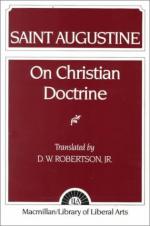
|
| Name: _________________________ | Period: ___________________ |
This quiz consists of 5 multiple choice and 5 short answer questions through Book Three.
Multiple Choice Questions
1. What is the first important distinction that Augustine makes in Book One?
(a) The distinction between learning and teaching.
(b) The distinction between discovering what Scripture teaches and communicating it.
(c) The distinction between "enjoy" and "use."
(d) The distinction between the Christian conception of love and the pagan conception of love.
2. From what type of education does Augustine develop his curriculum of Scriptural learning?
(a) A classical education.
(b) An ecclesiastical education.
(c) A Hasidic education.
(d) A Nazarene education.
3. What are the primary possessions of the student of Scripture, according to Augustine in Book Two?
(a) Love, illuminated truth, and the inner eye.
(b) Special gifts, things, and signs.
(c) Faith, hope, and love.
(d) Illuminated truth, the inner eye, and faith.
4. Why does Augustine claim this knowledge is required to understand what Scripture teaches?
(a) Because knowing the demands of the law of Israel helps to understand the freedom that Christians have through the atoning death of Christ.
(b) Because knowing the language, culture, and settings of the Scriptural record guides in making correct interpretations of Scripture.
(c) Because knowing the dietary and moral laws of the Nazarites aids in understanding the life and miracles of Christ.
(d) Because knowing the history of Israel and the prophecies concerning Christ makes a full connection between Israelite and Christian Scriptures.
5. If Augustine sets a standard for how to interpret Scriptural characters literally, and he applies the converse of that standard for interpreting Scriptural character's figuratively, how would that standard be articulated?
(a) A figurative interpretation of a holy Scriptural character will be applied to language and speech that embraces evil and condemns love or kindness.
(b) A figurative interpretation of a holy Scriptural character will be applied to language and speech that defines how a sign is a thing.
(c) A figurative interpretation of a holy Scriptural character will be applied to language and speech that describes condemnations on the chosen of God.
(d) A figurative interpretation of a holy Scriptural character will be applied to language and speech that embraces evil and condemns love or kindness.
Short Answer Questions
1. What are some of the practices of these categories in which humans must not participate?
2. What does Augustine call signs that are only used to express and transmit thoughts?
3. What does Augustine suggest a conception of Christian love will serve for the student?
4. What is the subject that Augustine addresses in Book One and Book Two?
5. What does Augustine recommend as methods for handling the topic in Book Three?
|
This section contains 575 words (approx. 2 pages at 300 words per page) |

|




